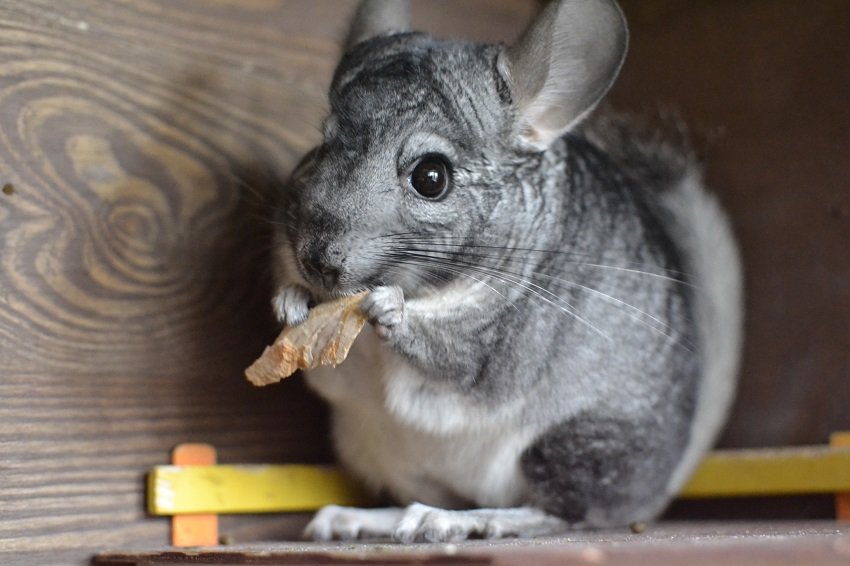Your chinchilla’s longevity largely depends on the quality of its food. Its diet must be strict and correspond to that of a self-respecting herbivore. Therefore, there is a plethora of forbidden foods. They can be dangerous for his intestinal transit, or quite simply for his health, because some turn out to be toxic.
Your chinchilla should eat hay, greens, and pellets daily. These are the 2 essential foods for its development and the maintenance of its health. Any superfluous food (vegetables, fruits) must be offered to him sparingly and very punctually. Each time, the sugar must be absent. Either way, your chinchilla should be fed as if it were in its natural environment. And the latter offers him very little food.
The Forbidden Woods
Your chinchilla is particularly sensitive to the antlers given to it. If it manages to digest most of the wood from fruit trees relatively and correctly, this is not the case for all wood.
Thus, you will avoid giving it birch, cedar, oak, spruce, eucalyptus, juniper, walnut, licorice, fir, weeping willow, elderberry, and linden wood. As for fruit trees, the apricot tree is to be banned, because it is toxic, as is the nectarine tree, just like the cherry tree, the orange tree, the grapefruit tree, the peach tree, and the plum tree.
You notice that woods from citrus fruits are not good. Indeed, citrus fruits and the majority of fresh fruits are to be avoided in their diet. They are often too acidic and above all too sweet.
Prohibited Fruits And Vegetables
All vegetables given to your chinchilla should be given in small quantities, very occasionally, and above all not moistened. Indeed, a trace of humidity can cause diarrhea in your rodent. Water-rich vegetables are not recommended.
As for fresh fruits, they generally contain too much sugar. Citrus fruits are to be banned completely. Beware of pips and pits as well.
Avoid the following foods at all costs: avocado, mistletoe berries, cauliflower, acorn, horse chestnut, and potato. They are not to be included in his diet. Avocado and cauliflower in particular have harmful effects on his nervous system.
Poisonous Seeds
Your chinchilla should never take a small aperitif with you. Indeed, many seeds are very bad for his health and can lead to serious liver diseases.
Peanuts, hazelnuts, almonds, cereals and simple nuts in general should therefore be avoided. Wheat and sunflower seeds are also to be avoided in their diet.
Other Foods To Forget
Of course, this herbivore does not need any animal protein. Meat is therefore not to be included in his diet, just like eggs.
The latter also and above all does not need chocolate. Theobromine can be fatal to your chinchilla, even in small amounts. Candies, pastries, honey, bread, dairy products, mushrooms, popcorn, and corn, are all foods to avoid.
Onion, garlic, and shallot reduce his red blood cells and can lead him to death quite quickly.
Finally, you will avoid giving him tobacco or even a drop of alcohol, tea, or coffee. In addition to disrupting his digestive system, you will put his vital organs and nervous system at risk.
Poisonous Plants
In addition to certain woods, your chinchilla should never swallow the following plants, which are particularly toxic to him: philodendron, dieffenbachia, aconite, anemone, Anagallis, belladonna, buttercup, hemlock, colchicum, and even poppy, euphorbia, fern, daffodil, or even mercuriale, chickweed, mustard, lily of the valley, poppy, cowslip, buttercup, rubber tree, jimson weed, ornamental plants in general.
What To Do With Food Poisoning?
Your chinchilla may inadvertently swallow any of the foods listed above. In this case, your responsiveness is paramount. It does not matter if he only suffers from diarrhea, vomiting, or even dizziness, convulsions, or lethargy, you must react immediately.
You need to take your rodent to the vet, knowing exactly what it ate and how much was absorbed. The more specific you can be, the better chance the vet will have of helping your chinchilla out.
Sometimes, unfortunately, poisoning proves fatal, especially when it affects vital organs such as the liver, kidneys, heart, lungs, or brain.
